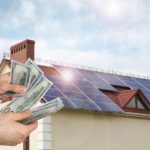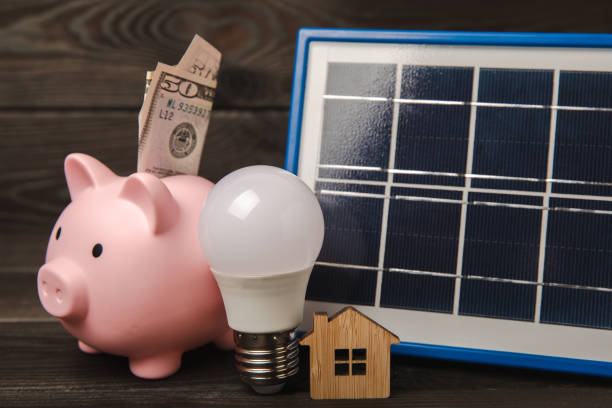Want to save money on your electricity bill and the environment? Commercial solar systems can reduce 75% of your energy bills. According to EnergySage, a residential system could pay for itself within eight years.
Solar energy is a controversial topic due to its high initial cost. Before committing, they want to be sure that the Return on their investment (ROI) will be good.
Simply Solar is proud of our team’s hands-on approach to bringing clean, renewable energy to the Bay Area. We are committed to helping you make the best-informed decisions regarding solar energy.
Our guide will help you understand the costs and benefits of solar energy so that you can maximize your Return on investment from solar panel installations.
What is Return on investment?
ROI is a measure of the profit made from an investment. If you invested $1,000 in the stock exchange and made $2,500 on the sale of stocks, your profit would be $1,500. Your ROI would then be expressed as a percent: 150%.
It’s not as simple as it seems. It is important to consider many factors when calculating the ROI, such as installation costs, labor, and maintenance. The ROI also takes into account market value and energy saving.
The best home improvement for the short term is to replace a garage with a 93.8% return on investment. The average cost of a new garage door is $3907, and the resale price is $3663.
This average Return on investment may or may NOT apply to you.
Your resale price may be lower or higher. Installation costs may be lower or higher. You may have to replace or repair your garage door if it is defective and there is no warranty.
Installing solar energy is a good long-term investment that can have a high return on investment. The initial Return on investment will be small until the system is paid for.
Energy savings and increased home value could equal returns of up to 200% in areas with lots of sunshine, like the California Bay Area.
Solar Panels and Your ROI
Installation costs are determined by the firm you select and the size of the solar energy system. The roof is also a factor.
When maximizing ROI, it’s crucial not to sacrifice quality or make cuts. Your ROI is a long-term investment, so any additional expenses due to shoddy panels and improper installation will cancel out your short-term savings.
It would be best if you considered the following factors to get the most out of solar energy:
- Installation cost- including labor
- The size of the project
- Preparing the property for installation
- Warranty and Insurance
- Financing costs
The best solar energy options for your home or company will give you the greatest ROI.
Solar energy systems should be of high quality and installed by professionals with experience. The design should be customized to meet your needs and wants.
Solar Energy Companies: How to Choose the Right One
Finding a quality company to install solar panels is the same whether you are shopping for commercial or residential Solar. It would be best if you looked out for a number of factors when choosing a top-notch company.
- NABCEP is a certification and licensing agency.
- Credibility (reviews and ratings)
- Experience
- Flexibility
- Seller tactics (predatory lending, strong-arming).
- Quality products
- Warranty Offers
Good solar energy companies will check all these boxes and not sacrifice one for the other. Any compromise made in these categories can take a significant chunk out of your ROI.
You can’t be sure that your solar panel installation is safe, effective, or correctly installed if you don’t have the right qualifications, credibility, and experience.
You’ll get a solar system with little benefit if you compromise on the flexibility.
Solar energy scammers will pressure their clients into signing contracts or accepting predatory loan terms. Quality companies will help you determine whether solar energy is feasible for you.
With routine maintenance, good-quality panels can last for 25-30 years. Low-quality solar panels have a lifespan of 5-10 years. They degrade their performance faster and are more vulnerable to damage from wind, weather, or debris.
A reputable company that sells solar energy will explain to you what warranty and coverage is included.
Solar Energy System Size
Costs are determined by the kilowatt or megawatt of solar panels (residential and commercial). The size of the solar system depends on
- The size of the building or home
- The average energy consumption of the company
- Local climate
- Roof size and orientation
These factors can be optimized to improve ROI.
The size of the building is not the most important aspect when it comes to solar energy. The energy consumption, climate, and sunlight of two towers of similar measures can be very different.
Protecting against energy losses can help you reduce your energy consumption. You can reduce energy losses in a few simple ways:
- Proper insulation
- Modern HVAC systems
- Lighting and appliances that are energy-efficient
- Eliminating “energy vampires”
- Smart thermostats
- Sun-blocking window treatments or screens
You cannot change the climate or orientation of your roof. You can still make some adjustments, such as trimming back trees or rearranging panels.
Solar panels can be mounted on ground mounts or tilt arrays to receive more direct sunlight.
Solar Panels and Roofing
Solar panels are better suited for certain roof types than others. Solar panels can turn small roof problems into major roofing issues.
Roof problems that need to be addressed before solar panel installation include
- Structural Integrity
- Dry Rot
- Water run-off
- Repair/replacement of Shingles
- Debris build-up (overhanging tree branches, leaves)
- Fungi patches, streaks, and spots
Professional roof assessment could save you thousands. Small repairs and maintenance will also save you money.
You’ll need to pay for expensive roof repairs if your roof collapses following the installation of solar panels. This is on top of any solar investment costs. There will be a huge hole in the ceiling where solar panels and your ROI should be.
The average cost for large roof repairs is $7,000. Small routine maintenance costs between $150 and $400.
Your roof will be a more profitable investment if it’s in top shape before you install solar panels.
Solar Energy Warranties and Insurance
You are responsible for any costs associated with defective parts and equipment if you don’t have a warranty. Warranty can come from the manufacturer, staller, or both. Warranties cover performance, artistry, and equipment (product/parts).
The warranty also covers the efficiency of solar panels. Your deposit will cover a solar panel whose output falls below a specified baseline.
According to EnergySage, most warranties guarantee 80-90% of output after a specified time. The contract may set a maximum degradation, such as 10-20% for the lifetime of the panel or less than 0.3% per year.
The product warranty will cover certain solar energy system components. The contract can cover:
- The panel covers and frames
- Photovoltaic cell
- Wiring
- Inverters
- Batteries
- Mount systems
An artistry warranty covers the labor for solar installation. Solar energy systems can be complex, involving wiring inverters into existing electrical systems.
A converter that is faulty or incorrectly installed will quickly reduce your Return on inReturnnt and shorten the life of your solar system. You’ll be on your own if there is no warranty for the inverter.
You should be aware of the terms and conditions that apply to all warranties. The warranty can last from 5-10 or the entire expected lifespan of the panel.
Some homeowners’ insurance can cover solar energy systems. Commercial property insurance may cover some items for commercial Solar.
You should consult your insurance agent to determine whether you are covered for solar energy.
Solar Energy Financing
Solar energy systems for commercial use are expensive, and not everyone is able to pay in full upfront. Solar loans or solar leases are similar to car leases or loans.
Both options have their pros and cons. You can determine the best option for you by comparing whether to buy or lease a system.
Solar Energy Loans
- Solar energy systems are yours.
- Any issues that are not covered by warranty or insurance fall under your responsibility.
- Rarely is a guarantee of energy production offered.
- Solar energy rebates and credits are available.
- Your home/commercial property value will increase.
- Over time, you will pay less in finance costs.








